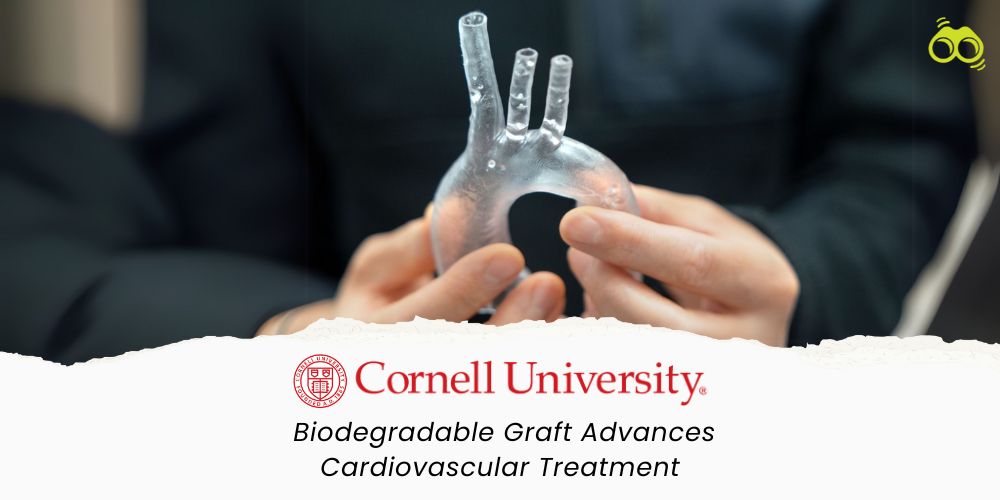Cornell’s Ecosystem Fuels Anova Biomedical’s Progress in Biodegradable Vascular Graft Development
Innovative Graft Technology by Anova Aims to Improve Outcomes for Dialysis and Heart Patients
Cardiovascular diseases (CVDs) are the leading cause of death globally. In 2019, an estimated 17.9 million people died from CVDs, which represented 32% of all global deaths. Over three-quarters of these deaths occurred in low- and middle-income countries.To address this major health issue,Cornell engineers are developing an advanced biodegradable vascular graft to treat cardiovascular disease. Designed to expand and contract like arteries, the graft allows new cells to grow as it biodegrades, aiming to improve current technology, which only works for vessels larger than 5 millimeters.
Anthony D’Amato, former postdoctoral researcher in Professor Yadong Wang's lab, highlighted that millions suffer from end-stage renal and cardiovascular diseases, with limited treatment options. D’Amato and Wang, co-founders of Anova Biomedical, noted that while current cardiovascular repair materials have remained unchanged since the 1960s, they are not suitable for all cases.Furthermore, he mentioned that Anova has achieved several milestones with the help of Cornell's venture incubation ecosystem, adding that the process would have been much more challenging without the university's support.
In 2022, D’Amato received $180,000 from Cornell's Ignite Fellow for New Ventures program, which trains researchers to create start-ups and commercialize lab technologies. He explained that the initiative aims to accelerate the commercialization of Cornell technologies, keeping researchers involved. Anova has licensed 11 patents from Wang's lab, covering composition, design, and manufacturing. After completing the Ignite program in July 2024, D’Amato became Anova's CEO. During the same period, Anova received a $65,000 manufacturing grant from FuzeHub and was admitted to Cornell's Center for Life Science Ventures in September 2024. With Cornell's support, Anova developed its fourth graft design, featuring a tough elastomer material that springs back into shape. The support also helped Anova secure a $275,000 Small Business Innovation Research grant from the National Science Foundation in August 2024 for 3D printing resin development.
In October 2024, Anova won first place and a $150,000 investment in the FuzeHub Commercialization Competition at the New York State Innovation Summit. Wang began working on the technology in 2000 during his postdoctoral research under Robert Langer at MIT. Initially tasked with creating a biodegradable material for liver repair, Wang later shifted focus to blood vessels, believing existing materials were inadequate for this demanding application. Anova’s metallo-elastomer mimics the natural elasticity of blood vessels, stretching and returning to its original shape due to metal ions that bind the material’s molecules. Wang explained that current treatments for blocked arteries, such as stents or vein grafts, often come with complications. D’Amato’s father’s emergency bypass led to a life-saving yet problematic vein graft, which motivated D’Amato to join Wang’s lab and work on improving vascular graft technology.
Wang added that Teflon grafts, commonly used when a patient's own graft is unavailable, are stiffer than arteries, causing tension, inflammation, and scarring at the junction, leading to graft failure in 20%-70% of cases.D’Amato explained that grafts are ineffective in areas with arteries smaller than 5 millimeters, like below the knee, often leading to amputations in diabetic patients.
Anova’s material, which expands and contracts like blood vessels and degrades in 9-12 months, aims to prevent issues like inflammation and clotting. While the goal is to use it for cardiac patients, the initial application will be for dialysis patients, who face a 60% failure rate with current grafts within a year. He further highlighted that dialysis patients endure painful, torturous experiences, often nearing the end of their lives. He mentioned that an experiment in March will help finalize the graft's design. Wang praised Cornell’s Center for Technology Licensing and incubator network for refining their ideas, providing expert guidance, and helping Anova advance through the regulatory process.
The development of advanced biodegradable vascular grafts by Cornell engineers holds immense potential for the future. This innovation aims to improve the treatment of cardiovascular diseases by providing safer, more effective options for patients, ultimately reducing complications and improving quality of life.
Editor's Note:
Cardiovascular diseases (CVDs) are a leading cause of death worldwide, claiming nearly 18 million lives each year. The impact on human health is profound, affecting individuals' quality of life and placing a significant burden on healthcare systems. Traditional treatments often come with complications, highlighting the urgent need for innovative solutions. The groundbreaking research at Cornell University, developing advanced biodegradable vascular grafts, marks a significant leap forward in addressing CVDs. These new grafts are designed to mimic natural blood vessels, offering safer and more effective treatments.
Skoobuzz appreciates the efforts of researchers and believes that this technology will transform the future of cardiovascular and renal healthcare.














0 Comments (Please Login To Continue)